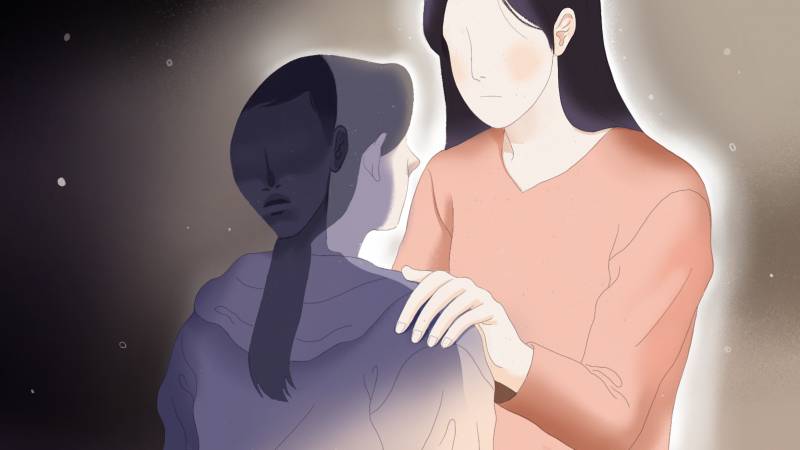And don't think of this as a one-off conversation; rather, think of it as one that is ongoing.
Be a trusted adult
A trusted adult could be a parent, but relatives, school counselors, pastors or even friends' parents can support a teen, too. It's a good idea to encourage your child to grow relationships with trusted adults in addition to their parents, so they have a network of support.
Espinoza says if you want to be one of these safe, trusted adults, you need to balance the protectiveness you feel for the teen with respect for their decisions. Let them know they can talk to you about anything. Many times, teens are scared of sharing something like relationship abuse — believing that they may get into trouble for dating when they weren't supposed to or that they won't be allowed to go out anymore.
"Just take the time to listen to what they have to share and don't give just advice," Espinoza says. "And then, if they ask for it, share your input as well."
She says that doesn't mean you can't share your values or what you believe, just do it so that the emphasis is always on how much you love the teen.
Espinoza suggests setting aside time when you can go for ice cream or take a walk or shoot hoops. That helps build that relationship because it shows you are available. It also makes it easier to spot changes in a child such as if they become withdrawn or start changing how they dress or suddenly have different friends.
Dixit says being "emotionally observant" goes a long way. But, she cautions, if a teen shares something about their dating partner, don't freak out, even if that's how you feel inside. She says dismissing the relationship and connection the teen feels can backfire. "If the parents say, 'Hey, you can't see [that person],' what ends up happening? They'll start sneaking out or sneaking around." She says have open and honest conversation instead by saying, "Let me hear your needs and you can hear our needs as parents, too. And how can we help you?"
Model healthy relationships
Dixit says showing a teen what a "healthy relationship" looks like is at the heart of preventing abusive ones. "It's really the ability to feel like you're equal when you're with your partner. Is there humor? Is there respect? Do you feel scared when you voice an opinion, or are you heard and received? Do you feel physically safe? Do you feel mentally safe? Is there respect for boundaries?"
She says that sometimes, parents inadvertently model similar power dynamics as abusers — where they don't empower teens to set boundaries, where they equate love with control. "If the youth sees love as control and invasion, then we have not helped them build the muscle that recognizes boundaries and asserts [them]," Dixit says.
Examine how boundaries are treated in your home, she says. How do members treat emotions? Is there a culture of shame and silence when you are unhappy with your teen?
While all this is something to strive for, Dixit also says, recognize that no parent is perfect. "I have to remind all adults to have self-compassion."
Recognize that friends are important
Remember that developmentally, your teen's peer group is very important to them at this age, and they can be a strong source of support. "Friends can get where no hotline [or] parents can," Dixit says. An abuser relies on isolation, and a friend can break that. They can also remind the teen that they're worth loving and respecting.
Even if you don't like your teen's friends, it isn't helpful to criticize them or tell your teen they can't hang out together. Instead, try to develop a dialogue so your teen feels heard.
Reach out for help
Dixit says if you suspect or know abuse is taking place, it's important to reach out for professional help. There are advocacy groups in every state — the more local the better because laws can differ. If you're helping a teen in an abusive relationship, don't stigmatize mental health, she says.
You can talk to counselors in organizations like hers, confidentially. Dixit says a counselor can help involve the teen in decisions so they have buy-in. And they can help your teen create a "safety plan" or a way to reach resources. That might include clarifying who the teen's safe adult is or which phone numbers a teen should memorize, should they need them.
This safety plan will differ based on the context. For example, in school, a safety plan may mean having a buddy walk with the teen between classes or having a code word with friends to indicate that the teen needs help.
These friends can reach out for professional resources, too. Espinoza says she always tells teens that when a friend is in an abusive relationship, they are not breaking the friend's trust by telling an adult what's going on — in fact, they are helping.
The podcast portion of this episode was produced by Clare Marie Schneider.
We'd love to hear from you. Leave us a voicemail at 202-216-9823 or email us at LifeKit@npr.org.



9(MDAxOTAwOTE4MDEyMTkxMDAzNjczZDljZA004))